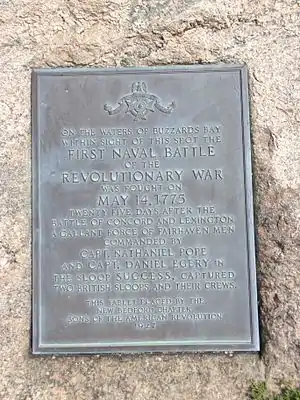Battle off Fairhaven
The Battle off Fairhaven was the first naval engagement of the American Revolutionary War. It took place on May 14, 1775, in Buzzards Bay off Fairhaven, Massachusetts (formerly known as Dartmouth, Massachusetts) and resulted in Patriot militia retrieving two vessels that had been captured by HMS Falcon. The patriots also captured the 13 man crew of the Royal Navy, the first naval prisoners of the war.[1]
| Battle off Fairhaven | |||||||
|---|---|---|---|---|---|---|---|
| Part of the American Revolutionary War | |||||||
 1st Naval Battle American Revolution Fort Phoenix, Fairhaven | |||||||
| |||||||
| Belligerents | |||||||
|
| Massachusetts Bay | ||||||
| Commanders and leaders | |||||||
| John Linzee (Lindsey) |
Daniel Egery Nathaniel Pope | ||||||
| Strength | |||||||
|
HMS Falcon about 110 Royal Navy seamen |
Private sloop Success 30 militia men (Massachusetts militia) | ||||||
| Casualties and losses | |||||||
|
1 killed 2 wounded 13 prisoners | none | ||||||
Context
On April 19, 1775, the American Revolutionary War began with the Battles of Lexington and Concord in the British Province of Massachusetts Bay. Following the battle, the militia that had mustered to oppose the British besieged the city of Boston where the British troops were located.[2]
On 13 May 1775, HMS Falcon caught two patriot vessels whose owners, Jesse Barlow and Simeon Wing—the latter's vessel commanded by his son Thomas—were from Sandwich, Massachusetts.[3]
Engagement
A group of 30 patriots from Fairhaven were led by Captain Daniel Egery and Captain Nathaniel Pope of Fairhaven in the sloop Success (40 tons). This militia also included Benjamin Spooner, Noah Stoddard and Barnabas Hammond.[4] They retrieved two patriot vessels captured by the British crew of Captain John Linzee (Lindsey), Royal Navy commander of HMS Falcon (14 guns, 110 men).[5] The patriots took 13 British crew, the first naval prisoners of the war; two of them were wounded and one of them died.[6][7][8][9][10]
The people of Fairhaven went on to capture additional British ships. Privateers and others operating out of Fairhaven continued to harass the British Navy throughout the war.
Footnotes
- Daniel Ricketson. The History of New Bedford. 1858. p. 292-293.
- Leamon, James S (1995). Revolution Downeast: The War for American Independence in Maine. University of Massachusetts Press. ISBN 978-0-87023-959-5. , pp. 74–76
- Captain Thomas Wing (1754-1835) continued to serve in the war. Jesse Barlow (1749-1815) became a Captain in a volunteer company from 1775 to 1778 and was stationed at Staten Island, New York. Jesse Barlow had to pay £45 and give bonds to indemnify the Dartmouth people.
- George Tripp. The Town of Fairhaven in Four Wars. Old Dartmouth Historical Sketch. No.6. New Bedford Whaling Museum
- Captain Daniel Egery was from Dartmouth and a Lieutenant in Captain Benjamin Terry's Second Dartmouth Company, Colonel Thomas Gilbert's 2nd Bristol County Regiment in July, 1771. Prior to the Battle off Fairhaven, he was a Captain of a Company of Minute Men at Lexington. After the Battle of Fairhaven, on May 24, 1775, he was engaged as Captain in Colonel Timothy Danielson's Regiment and briefly attached to Colonel David Brewer's Regiment. (See The Massachusetts Magazine, Volume 10)
- George Tripp. The Town of Fairhaven in Four Wars. Old Dartmouth Historical Sketch. No.6. New Bedford Whaling Museum
- See Captain Nathaniel Pope's manuscript and Ellis's History for accounts of this rebellion.
- "Recapture of Falcon's Prizes: The First Naval Encounter of the War, 14 May 1775". Archived from the original on 3 March 2016. Retrieved 7 August 2014.
- First Naval Skimmish of the American Revolution
- Hamilton Hurd. History of Bristol County, Massachusetts, p. 269